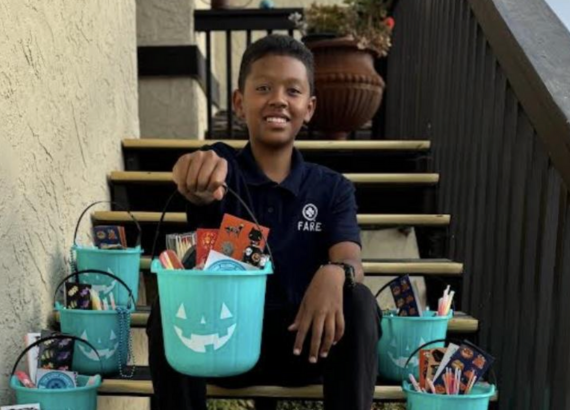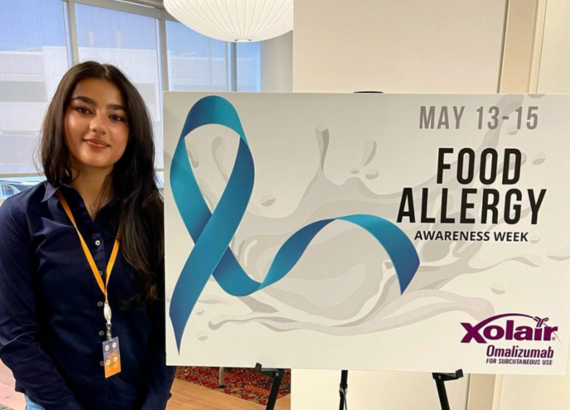How We Advocate for Ourselves and Others: Navigating Life with Food Allergy as Teens and Young Adults
This edition of Teen Corner spotlights six fearless teens who are transforming their food allergy experiences into powerful advocacy and meaningful change.
Meet the Teens
Click the cards, or scroll below, to read more.

Amari
“In May, during Food Allergy Awareness Month, I spearheaded a food allergy awareness walk at my school and raised $2,500 for FARE. Additionally, I purchased teal wristbands for the more than 120 student participants. I spoke about food allergy statistics, shared my positive experience with FARE, and encouraged attendees to become allies for students with food allergy. With FARE banners in our hands, we circled the school track three times. And once the event concluded, several students with food allergies approached me to express their gratitude for raising awareness and hosting the community event."

Arianna
“I am never shy or embarrassed to advocate for myself and my safety, whether I'm with peers, family, or strangers. The beauty of the allergy community is that we're all connected through our struggles and a deep understanding of the similar challenges and tribulations we all face. It is important to be an example for others and promote positivity, support, and courage.”

Kailee
“Community events play a vital role in self-advocacy. I have organized the Teal Pumpkin Project in my own neighborhood to help individuals with food allergies feel included. This initiative not only allowed me to enjoy a safe Halloween, but ensured that other youth with allergies could take part in trick-or-treating without the fear of an allergic reaction. By spreading awareness about the Teal Pumpkin Project, I inspired my church to incorporate non-food items into their trick or treating activities, making Halloween even more inclusive for everyone.”

Lara
“Self-advocacy sounds pretty straightforward, but with a food allergy, one judgemental look is all it takes to silence us and make us lose sight of what we’re fighting for. Over time, I discovered that the only way to overcome this feeling was to regain a sense of control in my life. Through intentional effort, I have learned how to advocate for myself. As a result, I became fearless in determining whether a meal was safe to eat. I always trust my instincts—–even if it means stepping away from an ultra-decadent triple chocolate cupcake, because my gut warns me of potential danger.”

Sreegouri
“The truth is, your knowledge has the ability to uplift and even save a life. This is why I write Google reviews and promote inclusive restaurants in my local community. And the best part? Anyone can start today and empower themselves and others to confidently manage their food allergies in public spaces.”

Tess
“My advocacy has already made a tangible difference in my school, the surrounding community, and even across the nation! I’ve raised local awareness by distributing 1,000 food allergy awareness placemats—–personally designed and paired with crayons—–to restaurants and children in the Charleston area. Additionally, I’ve spoken with over 2,500 students, teachers, and several newly-diagnosed families. On a larger scale, my efforts in advocating for the FASTER Act, an act passed in 2021 that designated sesame as the ninth major food allergen and requires it to be declared on food labels, has helped ensure that everyone living with a sesame allergy can spot their allergen on food labels.”
Read Their Stories
Amari
Raising awareness about food allergy in school can feel like an insurmountable challenge, but it’s so important for cultivating support and awareness among peers; taking initiative not only empowers me but also helps others see how they can be food allergy allies in everyday spaces. In May, during Food Allergy Awareness Month, I spearheaded a food allergy awareness walk at my school and raised $2,500 for FARE. Additionally, I purchased teal wristbands for the more than 120 student participants. I spoke about food allergy statistics, shared my positive experience with FARE, and encouraged attendees to become allies for students with food allergy. With FARE banners in our hands, we circled the school track three times. And once the event concluded, several students with food allergies approached me to express their gratitude for raising awareness and hosting the community event.
That event was just one part of my broader advocacy journey. I also lead multiple TAG projects to raise awareness and advocate for food allergies. I’m currently leading a project to supply teal pumpkins for the Teal Pumpkin Project, making Halloween inclusive for children with food allergies. Another project I am working on is focused on researching health equity challenges faced by people with food allergy and exploring potential solutions. Finally, I am leading a TAG project on identifying legislative advocacy opportunities related to food allergies.
Arianna
Living with food allergy can be a constant challenge; daily rituals and activities easily become struggles and pain points to surmount. Everyday outings–like going to restaurants, attending school or social events, and even enjoying summer camp–aren’t always as simple as they seem. Each one can bring unexpected risks and stressors. This raises two important questions: How does one advocate for their allergy within their community? How can people feel empowered enough to share their experiences and promote food allergy awareness in their everyday lives and in their communities?
When it comes to answering the first question, there are so many different ways to advocate for food allergies within your community! One effective approach is to engage with your local government: discuss the lack of allergy advocacy in your town and propose viable solutions. The key is to not only highlight the issue stated, but to additionally provide examples, a policy suggestion, a plan, and a specific request for action. Using myself as an example, I recently completed a project for my government class to create a policy suggestion. I specifically focused on procedures regarding allergies in restaurants. My policy suggestion was to enact a law requiring restaurants to list allergens on every menu and to ensure staff receive proper allergy-safety training. When the City Council meets next, it could champion these precautions. From there, the measure could progress as an act and, ultimately, a bill—helping my state follow in the footsteps of other states in advancing allergy awareness.
Answering the second question, there are many ways people can feel empowered to share their experiences and promote allergy awareness: posting online, creating videos, starting conversations in their communities, or simply talking with family and friends. I believe that the more the topic of allergy advocacy is heard and discussed, the greater the awareness becomes. Additionally, speaking openly about our allergies—and the severity of the condition—can encourage and empower others to do the same. Moreover, following reputable social-media accounts devoted to allergy awareness and advocacy has inspired me to speak openly in my day-to-day life about my allergy.
I am never shy or embarrassed to advocate for myself and my safety, whether I'm with peers, family, or strangers. The beauty of the allergy community is that we're all connected through our struggles and a deep understanding of the similar challenges and tribulations we all face. It is important to be an example for others and promote positivity, support, and courage.
Kailee
A striking 33 million individuals in the U.S. live with food allergies, which can significantly impact daily life—especially for teenagers balancing school, social events, extracurriculars, and increasing independence. With this in mind, empowering yourself and others in the food allergy community is essential and begins with the fundamental building blocks of advocacy, education, and open communication. Through self-advocacy and clear communication, we can create a supportive environment that fosters understanding and food allergy safety for all who are affected.
One of the most impactful ways to uplift yourself and educate others on food allergies is through community engagement. As a TAG (Teen Advisory Group) leader for FARE, I have been an advisor for global teen talks via Zoom, providing a platform for food allergy teens to connect, share stories, and provide valuable advice. Another way to advocate is through writing—I’ve authored blogs for FARE on navigating food allergy during the holidays, aiming to provide insight and advice in order to empower others to feel more confident in managing their food allergies.
Community events play a vital role in self-advocacy. I have organized the Teal Pumpkin Project in my own neighborhood to help individuals with food allergies feel included. This initiative not only allowed me to enjoy a safe Halloween, but ensured that other youth with allergies could take part in trick-or-treating without the fear of an allergic reaction. By spreading awareness about the Teal Pumpkin Project, I inspired my church to incorporate non-food items into their trick or treating activities, making Halloween even more inclusive for everyone.
In order to feel comfortable enough to uplift and empower others, you must first find the courage to advocate for yourself. A crucial component of advocacy includes speaking up for yourself. Speaking up about your food allergies is crucial—not only to protect your health and well-being but to set healthy boundaries, communicate effectively and clearly convey your priorities to others.
Moreover, fostering open dialogue with friends and family is key. Through encouraging your friends and family to discuss allergies openly, they can become increasingly educated about the importance of food allergy. Education is another powerful tool in advocacy. I actively educate my family, friends, and school about food allergies through showing them where I store my EpiPen at all times, what symptoms I may have in an allergic reaction, and what to do in the case of an allergic reaction. Through providing this information, I empower those around me, making situations safe and worry-free for everyone involved.
Lara
“All advocacy is, at its core, an exercise in empathy.” This quote from Samantha Power deeply resonates with me, capturing a powerful truth through simple—yet profound—language. As someone who has lived with a life-threatening peanut allergy since infancy, I have often felt powerless in my position, a sentiment I know is shared by millions of other young adults.
Self-advocacy sounds pretty straight forward, but with a food allergy, one judgemental look is all it takes to silence us and make us lose sight of what we’re fighting for. Over time, I discovered that the only way to overcome this feeling was to regain a sense of control in my life. Through intentional effort, I have learned how to advocate for myself. As a result, I became fearless in determining whether a meal was safe to eat. I always trust my instincts—even if it means stepping away from an ultra-decadent triple chocolate cupcake, because my gut warns me of potential danger.
Aside from being your own food allergy champion, it is equally as important to be an active advocate for the food allergy community. Whether it’s reporting reels or TikTok videos that mock food allergies, starting a local fundraiser to support organizations such as FARE, or simply talking to your peers about the realities of having food allergies, community advocacy is the most powerful way we can spread awareness. I’ve personally been honored to speak on the panel for Genentech’s Lunch & Learn session for Food Allergy Awareness Week, where I shared my experience living with a severe food allergy and gave advice to fellow members of the food allergy community on how to live beyond the diagnosis. Ultimately, people are heard when they’re understood. If you or a loved one has a food allergy, remember to be kind (to yourself and others) because that’s really all it takes to make a difference.
Sreegouri
Navigating restaurants with multiple food allergies can be overwhelming. I’ve found that advocating for myself—and sharing my experiences—can open doors to safer dining options. Speaking up and spreading awareness isn’t just about me, it’s about helping others cultivate confidence and safety too.
Recently, I visited a new Indian restaurant and called the establishment ahead of time to discuss my allergies. I honestly wasn’t sure what to expect or if I could be accommodated at all. However, the staff was gracious with me and prepared a special meal so that I would not have to eat at the buffet—preventing the risk of potential cross-contact and accidental exposure to an allergen.
Experiences like this motivate me as a food allergy advocate to share my story, so I left a review detailing my thoughts. Attempting to dine with multiple food allergies can often feel like a tall order. “What if there is nothing you can eat?” “What if an allergen accidentally ends up in your meal?” “What if…?”
To help others navigate these challenges, I write Google reviews that offer my honest experiences at restaurants. As someone living with allergies to eggs, all nuts, sesame, mushroom, shellfish, fish, and honey, I am eager to spread the word when I discover a new restaurant that works for me. Increasing public allergy awareness can start with just one post; every Google review contributes to a future where restaurants are more allergy-conscious. By highlighting establishments that support their customers with dietary restrictions, I can champion inclusive dining and help others with food allergies discover safe dining options. And the numbers don’t lie—tens of thousands have read my reviews, reinforcing my core belief that food allergy advocacy can be as simple as using your voice.
The truth is, your knowledge has the ability to uplift and even save a life. This is why I write Google reviews and promote inclusive restaurants in my local community. And the best part? Anyone can start today and empower themselves and others to confidently manage their food allergies in public spaces.
Tess
I have competed in pageants since I was ten, where each contestant is required to develop a “Community Service Initiative” (CSI). But for me, advocating for the food allergy community began long before that—since I was old enough to speak! My CSI, called “From Fear to Freedom,” is a meaningful outlet to educate the public about food allergy. I create cooking videos on social media that include allergy-friendly options, meet with legislators in South Carolina, and visit schools to promote inclusivity and awareness among the younger generation.
My advocacy has already made a tangible difference in my school, the surrounding community, and even across the nation! I’ve raised local awareness by distributing 1,000 food allergy awareness placemats—personally designed and paired with crayons—to restaurants and children in the Charleston area. Additionally, I’ve spoken with over 2,500 students, teachers, and several newly-diagnosed families. On a larger scale, my efforts in advocating for the FASTER Act, an act passed in 2021 that designated sesame as the ninth major food allergen and requires it to be declared on food labels, helped ensure that everyone living with a sesame allergy can spot their allergen on food labels. At my school, the cafeteria staff now labels ingredients, and transportation guidelines were revised to prioritize safe snacks for field trips. Finally, one of the most meaningful moments in my advocacy journey was making an appearance on my local news station, where I shared what it’s like to live with food allergy and what the public can do to practice inclusion and empathy.
What I’ve learned so far is that the most impactful way to raise awareness in our community is to speak up about our individual experiences. I have always been vocal about my food allergies (tree nuts, sesame seeds) and my older brother’s (dairy, tree nuts, sesame seeds). The world was not built with disabilities in mind, but thanks to FARE’s Teen Advisory Group members, our younger generations are given the opportunity to make a change.
By the Teen Advisory Group (TAG)


